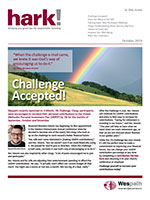
It’s a new year with new opportunities for you to focus on your financial future. Why not start now by increasing your retirement plan contributions?
The earlier you start, the more you’ll have for retirement. While it is a basic concept, it doesn’t do justice to the tremendous impact of time on investments. Another way to phrase this gets closer to the truth: When you start saving outweighs how much you save.
Let’s Look at an Example:*

- If you invested $200 a month from age 25 to 35 (10 years), it could grow to nearly $300,000 at age 67, without any additional retirement plan contributions.
- Wait a decade to start, and you will have to contribute for 3 times as long—you’d have approximately $275,000 if you saved $200 a month from age 35 to 67.
- And if you saved from age 25 to 67, you’d have more than $570,000!
Start Now
It’s easy to begin making contributions to the United Methodist Personal Investment Plan (UMPIP). Complete and return a Contribution Election form electing the percentage of income you want to contribute to the plan. Financial advisors recommend contributing 15% of your compensation. If you can’t afford that much, contribute at least enough to earn any matching contribution your conference, church or employer may offer.
Already Making Contributions?
It may be time for an increase. Consider making a greater contribution to your future when you receive compensation increases or bonuses—that’s when you’re less likely to notice an impact on your budget. If your conference or employer offers automatic contribution escalation**, your before-tax contributions may increase automatically each year.
* Calculations assume a 7% annual rate of return on investments. To run your own savings projections on the EY website, log in to wespath.eynavigate.com—go to Learning Center > Other resources > Calculators > Don’t Delay Your Savings.
** Review your Automatic Enrollment Notice or check with your plan sponsor to see if you are covered under automatic contribution escalation.

